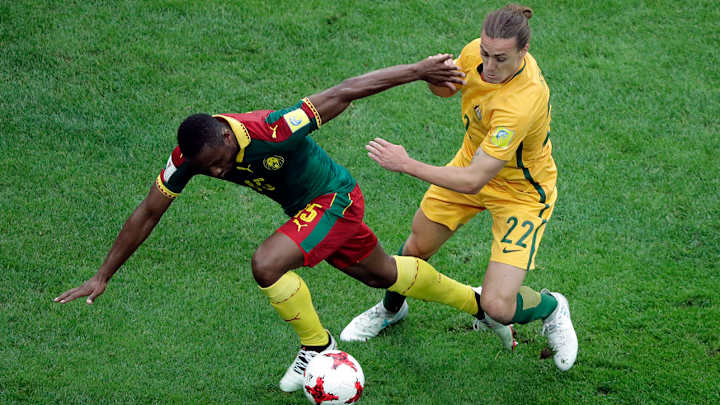FIFA strongly backs imperfect VAR system during Confederations Cup

Read about the latest sports tech news, innovations, ideas and products that impact players, fans and the sports industry at SportTechie.com.
FIFA head of refereeing Massimo Busacca simulated the sounds of the heartbeat when discussing the pressure that can impact the referee on the field while making sure the Video Assistant Referee system functions properly.
“They’re afraid,” Busacca said, making the heartbeat motion with his hands. “’What do I have to do? How do I have to tell?’ But then at the end, they keep calm, they communicate with each other, and the right decision is coming. And for us it’s the most important. We need the appropriate decision.”
Busacca spoke to the media in St. Petersburg two days before the start of the FIFA Confederations Cup, a high-profile tournament where national teams are currently getting a taste of the impact that the experimental replay system can have in real situations.
VAR causing confusion, discontent for some at FIFA Confederations Cup
While there has been some confusion and controversy as calls have been overturned with goals being nullified, FIFA has made obvious efforts to support VAR. In the middle of the tournament after the first round of group-stage matches saw VAR used five times — all on goal situations — FIFA president Gianni Infantino issued a statement Monday.
“I am extremely happy with VAR so far,” he said. “We have seen how video assistance has helped referees to make the correct decisions. This is what VAR is all about. The VAR tests during this Confederations Cup are also helping us to improve the processes and fine-tune communication. What fans have been waiting for over so many years is finally happening. This is a milestone tournament. Video Assistant Refereeing is the future of modern football.”
It’s also an imperfect system based upon the human element in evaluating video, Busacca notes, and one complete with interruptions and delays to the beautiful game.
The referee on the field can initiate a VAR based review upon recommendations from the VAR official. To signal the review, he draws a square not unlike this one.
When Uma Thurman ask for the #VAR #ConfederationsCup #AUSGER pic.twitter.com/KBlASfkjn5
— Jeipi (@jpbasoalto) June 19, 2017
By rule, calls on the field can only be overturned if the review shows a “clear error.” The referee on the field also makes the final decision.
“That is not like goal-line technology with a watch giving information to say, ‘goal, ‘no goal,’” Busacca said. “In front of a video, we continue to have a human still making an interpretation. So that’s why we want to use this interpretation and understand that in a few seconds something has to be clear because it’s a clear mistake.”
Of course, the decisions can actually take more than a few seconds. There are two VAR referees and one assistant to help on off-sides calls, according to Busacca, and they have multiple angles to view if one angle is not enough.
“In this moment in some situations, we are taking too long, the review,” Busacca said of testing that went on at the FIFA U-20 World Cup in South Korea last month. “We know because the referee the video, the heart starts to beat.”
“It’s difficult to say you need five, 10 or 15 seconds. What is important is you have the right result. It is also difficult to answer you how long it will be.
“Today in football the average of one game in 90 minutes, if we are lucky we play 57-60 minutes. Corner kick, free kick, injuries, so they lose 30 minutes. So what’s the problem to review 10 seconds more and to have the right result?”
Busacca said the results of testing at the U-20 World Cup were “very good,” with 12 decisions changed over 52 matches. But at the Confederations Cup—held in Russia in advance of the 2018 World Cup there when VAR could very well be used—not every VAR call has been deemed the right result by the outside world.
🤔 Was this offside?
— FOX Soccer (@FOXSoccer) June 18, 2017
Moments like this won't settle the VAR debate anytime soon. @Powerade #ConfedCup #CMRCHI https://t.co/s4u9vnePa6
On off-sides calls, Busacca said that at the U-20 World Cup, referees on the field were asked not to raise the flag in a case of doubt, letting it go so that if a goal was scored, VAR would have a review opportunity. Raising the flag on the field would eliminate the video review possibility.
Ultimately, FIFA wants the referee on the field to make the decision but to enable the VAR system to do its job.
Busacca went over a situation where a player who threw an elbow was given a red card upon further review.
“It was a clear message,” he said. “Technology—VAR—will be an incredible tool of prevention.
“We want fair play. We want to respect the image of football. And this has to be clear to the players. Be careful. Our camera is following you.”
Yet it’s also imperfect.
“We will never even with technolog —even with VAR—we will never have something perfect because football is not perfect,” Busacca said. “Players doing mistakes, they play football every day, but sometimes in the game, a mistake is committed. A clear score that could score, they don’t score. Goalkeepers. This is football. And for us, it’s the same—even in front of a video.”
